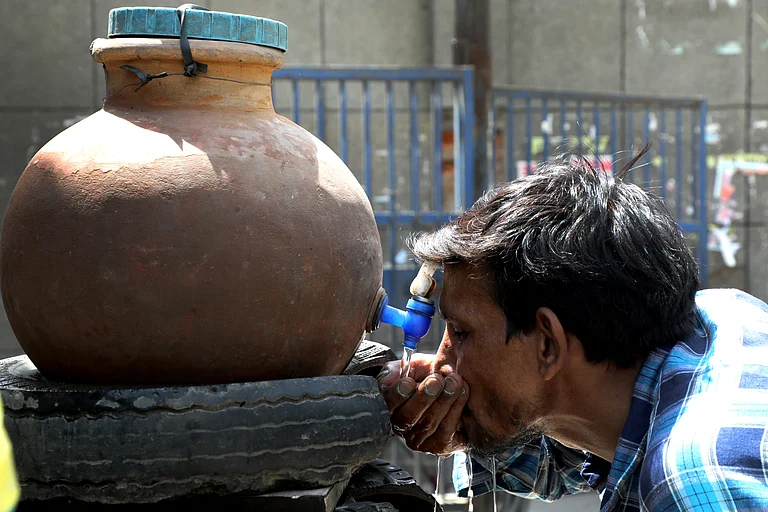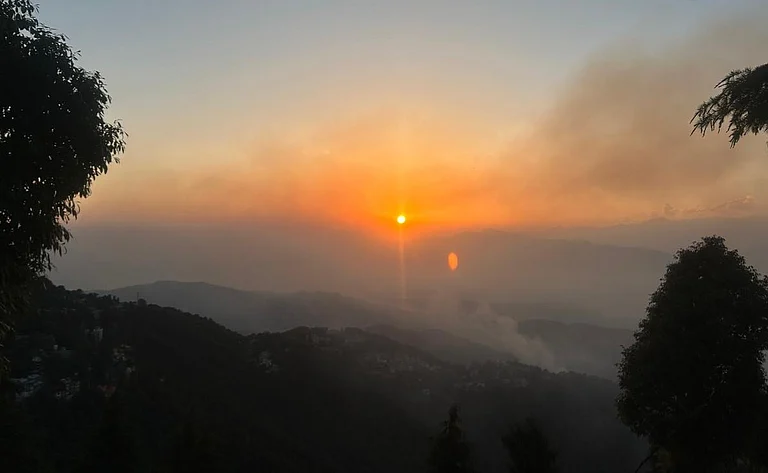Over 33,000 fully grown trees are to be cut in Uttar Pradesh’s Muzaffarnagar, Ghaziabad and Meerut to give way for a separate 111km corridor for Kanwariyas, the UP government has informed the National Green Tribunal (NGT).
Over 33,000 Fully Grown Trees Under Threat In UP As Ministry Approves Kanwar Route Project
Environmental activists have expressed concerns about the irreversible climate change cutting of trees will cause and the detrimental impact it will have on people especially as much of North India remains in the grip of severe heat waves
The Union Ministry of Environment, Forest and Climate Change has permitted the state government to cut down 1.1 lakh trees and plants for the project in the three districts, according to media reports. The NGT has taken suo moto cognisance of the order and the panel comprising NGT chairperson Prakash Srivastava, Arun Kumar Tyagi and expert member A Senthil Vel, has sought more details on the matter.
The Kanwar route was proposed in 2018 as an alternative to the usual route through Western UP and Uttarakhand, which often became "very crowded" and disrupted daily traffic flow, as per the UP government.
The Yatra is an annual pilgrimage undertaken by millions of Hindu devotees during the Hindu month of Shravan, where the pilgrims travel to collect sacred water from the river Ganga which they then carry back to their local Shiva temples to perform rituals and offer it to the deity Shiva.
The state government told NGT, “This route is included in the ‘very crowded’ category for common people and devotees. A total of 54 villages in three districts of Muzaffarnagar, Meerut and Ghaziabad fall on this route. There is a lot of disruption to traffic movement during the month of Shravan,” according to a TOI report.
Several environmental activists and organisations have called out the UP government and expressed their concerns about the irreversible climate change the cutting of trees will cause and the detrimental impact it will have on people especially as much of North India remains in the grip of severe heat waves.
Jhatkaa.org, a digital advocacy organisation, started a petition to ‘Save 33,000 trees in Uttar Pradesh’ with over 11,000 signatures received so far. Its Associate Campaigns Director Roshan Kedar said, “There is a consensus among the public that this is not a very good decision by the government.”
“We run digital petitions on issues regarding climate change and there are multiple issues we work in but one of them is definitely deforestation…everytime there is an issue like this, we try to see what is the perception of public on this,” he said.
Kedar believes the impact of such large-scale cutting of trees would be detrimental not just for the environment but also for the kanwariyas for whom the corridor is being built. “If lakhs of people are going to walk on this for the Yatra, they are the first ones who will suffer because of this massive tree cutting. It’s not just tree cutting itself which will be problematic, but then there will be a massive concretisation because of the widening of the road and additional concretisation will aggregate the whole urban heat island effect as most of the North Indian cities are facing heat waves because of the urban heat island problem.”
A PWD official told TOI, the compensatory afforestation would take place in Lalitpur district, hundreds of kilometres away from the deforestation site.
Roshan Kedar says planting the trees somewhere else would highly impact local temperatures.
“There is a double whammy that is going to happen. The cutting of the trees which are providing the shade, but at the same time they are planting these trees not on the same route, they’re planting these trees somewhere else, that means the temperatures in these districts on the route of the Kanwar Yatra will be really really high.”
He adds that the proposed compensation would be no match to the fully-grown trees which will be cut, with the newly planted tree taking decades to grow to the same size. “So when we say compensatory it doesn't mean it is going to compensate the effects right away and there is also no guarantee how many trees from that compensatory afforestation will survive because survival rates of these is low.”
Fridays For Future, a global climate movement, questioned why one must have to choose between devotion and environment in a social media post referring to the Kanwar route project. “Should we really have to choose between devotion and the environment? Or is the real question why our policymakers can’t come up with eco-friendly development plans? Irrespective of which faith we follow, isn’t our first devotion to our Mother Nature? It’s time to demand sustainable solutions that respect both our traditions and our planet,” the post read.
The coordinator of FFF Uttar Pradesh's Gorakhpur chapter, Nevish, told Outlook that the environmental cost of felling such a large number of trees could not be ignored.
"We are witnessing what is happening right now, global warming has became global boiling and specially in UP higher temperature is breaking records everyday, so cutting down 33k mature trees is like digging our own grave," they said.
While FFF acknowledged that the project aimed to provide "a safer, more organised route" for the millions of Kanwariyas, there were alternatives that could be considered.
"Balancing religious and cultural practices with environmental sustainability is a complex challenge but alternatives such as rerouting the corridor, implementing afforestation projects, or using modern construction techniques to minimise tree loss could be explored," Nevish told Outlook.
The youth-led, grassroots Indian climate justice movement coordinator believes the cutting of such a large number of trees will be felt both in the short as well as the long-term.
While in the short term, there will be a significant loss of biodiversity, disrupting habitats for various species of flora and fauna, in addition to the sudden reduction in tree cover exacerbating air pollution levels, the long-term effects could even be more dangerous.
"...including increased soil erosion, reduced groundwater recharge, and a disturbance in the local climate which leads to urban heat island effects, making the area hotter and less hospitable for residents," Nevish said.
FFF says this is not the first time a developmental project in UP has raised concerns about deforestation and environmental degradation.
"One notable project is the construction of the Purvanchal Expressway and the Bundelkhand Expressway, which has required the clearing of significant tracts of forest land to make way for the highway."
Nevish says while government may attempt to compensate for the loss by implementing reforestation programs or creating green spaces elsewhere, the ecological impact of such large-scale deforestation is not easily mitigated.
The next date of hearing is scheduled for July 8.

